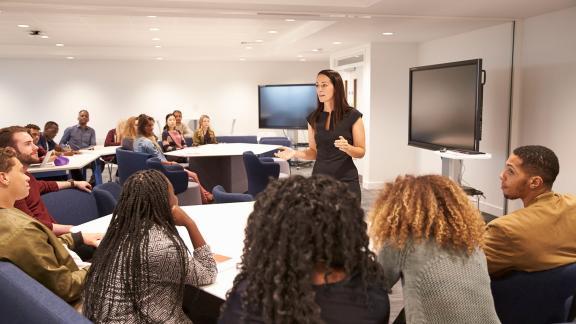Why pronouns matter

Dr Jamie Willo, child and adolescent psychoanalytic psychotherapist at Sussex Partnership NHS Foundation Trust, shares their experience of asking for specific pronouns to be used as a trans non-binary person.
When I first came out as trans non-binary at work, many years ago, I asked my colleagues to start using ‘they, them’ pronouns when referring to me. I received a phone call a week or so later from a senior lead saying that the leadership team were finding it too difficult to use ‘they, them’ pronouns for me so would I instead choose between using ‘she’ or ‘he’.
This left me in a difficult position, as on the one hand I was disappointed, I wanted to be my authentic self at work and to use the pronoun I identified with, but on the other hand I respected the person asking me, I didn’t want to lose my good relationships with my colleagues and I worried it may affect my developing job role if I did not respond positively to the request. I put my psychoanalytic hat on and tried to see past the behaviour and to acknowledge to myself that it is a difficult shift for people to make. I reflected that I must pick my battles wisely, so I should probably take one for the team.
I consoled myself with the idea that using a binary pronoun might help me to not alienate other colleagues too, especially as I was embarking on designing LGBTQ+/ gender identity training sessions for NHS staff. I wanted to be accepted within my workplace in order to be able to make meaningful change for the non-binary community moving forward. So, I accepted the invitation, I added: "My pronoun is ‘they/he’" to my email signature, and then it was official, I had made the concession.
In my eyes the above reflected society’s non-acceptance of non-binary identity. I thought to myself, if this is what it takes for me to get the conversation started, then I’m in. I was forgiving to the senior leads who clearly didn’t understand the importance of pronouns at the time, however, it left me with an even stronger desire to help to educate NHS staff, at all levels and pay bands.
Today, I deliver LGBTQ+/ gender identity training, almost daily, to employees at all levels in my current trust and to employees in other organisations across the UK. I make sure that I tell my story as an example to attendees at the sessions, in order to get people thinking and talking about how this could have been different for myself and other non-binary people. I have also worked with our LGBTQ+ staff network to get pronoun campaigns up and running to promote awareness throughout the trust.
It can feel difficult when having to refer to other people using pronouns you are not used to, it takes time to get used to the change. However, it is worth it, to stick with it, and it is the right thing to do. I am trans non-binary myself, so I’m expected to be a gender identity expert, however, I still make mistakes. Unfortunately, if we are not paying attention all of our eyes can play tricks on us due to our social conditioning, assumptions and expectations.
My advice to you is to slow down, think about what you are saying and try your best. Don’t be afraid to get it wrong, and if you do just apologise and move on and try again next time. Society still has a long way to go, but we all have our part to play in making our society a more inclusive place which celebrates difference and diversity.
I am living in a space where a lot of people are situated, however, it is not talked about. How do we stop having to make concessions, how can we be taken seriously for the individuals that we are, with gravitas, and when will we be allowed to be our full selves?
Using pronouns in a healthcare setting
Using an individual’s correct pronoun in a healthcare setting gives a non-binary person (patient or staff) “the signal that it [is] safe to bring all parts of themselves to the [healthcare setting] and that all of them [their whole self] [is] being seen” (Gibson and Fernandez, 2018).
Generally speaking:
“The first person to assign a pronoun to another person in a social situation (including a healthcare setting) plays a pivotal role in establishing the person’s gender identity and pronoun to those present. On a superficial level, pronoun usage may appear to be a social pleasantry that has little impact on service delivery. In fact, pronoun cueing is a fundamental component of social interactions that has the power to effectively challenge systemic inequities or to construct formidable access barriers.” (Moon, 2010)
Mispronouning a non-binary person can leave them feeling misunderstood, invalidated and unaccepted. Some non-binary people have described how it feels like a physical jolt running through them when they are mispronouned.
Dr Jamie Willo is a Darzi Fellow and a child and adolescent psychoanalytic psychotherapist. They have worked for Sussex Partnership NHS Foundation Trust for 14 years in CAMHS. They are now the trust’s LGBTQ+ inclusion training lead.
Jamie delivers LGBTQ+/ gender identity training to NHS trusts across the UK. Contact Jamie for more information.



